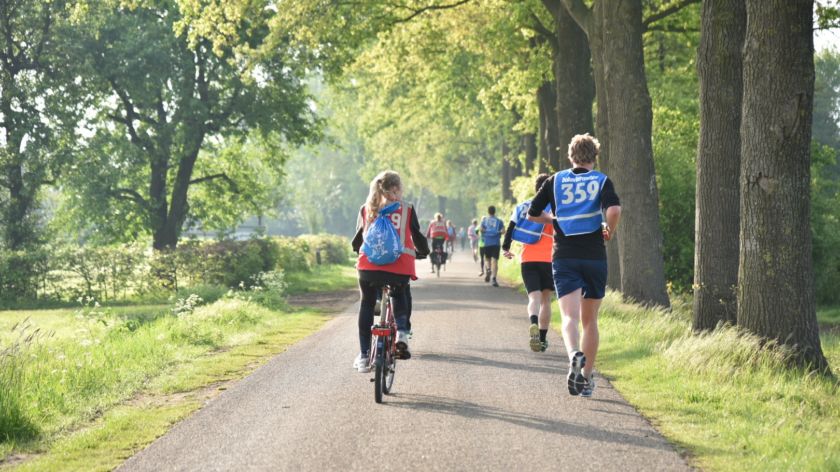How the Batavierenrace became big (and wants to stay that way the coming years)
-
 De Batavierenrace. Photo: Steven Huls
De Batavierenrace. Photo: Steven Huls
For the last fifty years, the biggest relay race in the world has started in Nijmegen. During the spring, no less than 8000 students run to Enschede to finish the race there and have a huge party. How did the Batavierenrace become this big? And how does the organisation want it to stay that way the coming fifty years? A look at the past and the future.
On April 29 and 30 it is time for the annual ‘Bata’. Thousands of students run through the eastern part of the Netherlands – and a little way through Germany – to compete in a relay race. After being absent for two years because of covid and with an anniversary to be celebrated, this promises to be a special edition.
It all started in 1973. A group of students from Nijmegen saw a student relay race in Sweden. That was so beautiful, it had to be held in the Netherlands as well, says organisation member Bob Fleer. ‘So around 500 students ran from Nijmegen to Rotterdam back then,’ he says.
‘We have broken our own Guinness World Record a few times’
Since then, students ran every year, except for 2001, 2020 and 2021. Every year a virus was the cause of the cancellation. In 2001 it was a foot-and-mouth disease in animals, which made it impossible to run through nature in the Achterhoek region of the Netherlands. And in 2020 and 2021 the culprit was – you might have guessed it – covid.
8509 runners
During the first races, a few hundred students ran. After a couple of years, that number grew to be in the thousands. ‘Officially we have been the largest run in the world for years,’ Fleer proudly says. ‘We have broken our own Guinness World Record a few times.’ The current record stands at 8509 runners.
How is it possible that the race has appealed to so many students, and still does? ‘Honestly: a lot of people don’t even like running,’ a board member admits. He himself studies at the HAN to become a teacher in economics. ‘But it is all about the fraternisation, the ambience during the whole event. The Bata feeling, we call it. It is hard to describe.’
‘It remains a challenge to recruit enough volunteers every year’
Also noteworthy: the entire organisation consists of volunteers and students. For the entire year, nine students work on the race full-time and there are sixty committee members active. During the race, there are 650 volunteers present. ‘The fact that so many people try their hardest to help, is truly unique. Still, it remains a challenge to recruit enough volunteers every year.’
Online editions
The online editions did not make this challenge any easier. The branding and reputation of the event largely dissappeare, Fleer said at the time. Last year, it therefore proved difficult to find board members, and an investigation was even set up to map out the future permanence of the race. This year, the organisation is again looking for a new board.
‘It was a big disappointment anyway,’ says Fleer about last year. ‘You put so much time and effort into all kinds of plans and then you can’t execute any of them.’ Yet it also made the organisation creative. For example, hundreds of runners ran independently and kept track of their distances with tracking apps, the livestream was watched in great numbers and the annual ‘Bataradio’ turned out to be an extra big success.
‘We have a special theme: Bata to the Future’
Nevertheless, the organisation is looking forward to a physical edition at last. Because of the anniversary, special things are planned. ‘We have a special theme: Bata to the Future, inspired by the film Back to the Future,’ says Fleer. ‘We will use the neon colours from the eighties at the points of exchange. The restart will be larger, and in smaller places like Ulft and Barchem there will be fun extras on the programme.’ What this entails exactly, the board is keeping a secret for the time being.
Future
Thinking about the next fifty years, the organisation does plenty. The main goal is to remain a sporting event for and by students, according to Fleer. Last year’s survey showed that the race needs to keep innovating. The current board has therefore made a set-up for new boards, so that they can get to work on that point. There are also ambitions to put together a new route. ‘And personally I think it would be really cool to break our record again,’ Fleer dreams.
But first the organisation is going to enjoy the coming week and roll up their sleeves. Fleer will not be running this time. ‘No, I’m too busy,’ he laughs. ‘But it will be amazing anyway. I can’t wait.’



